Unit3I'mmoreoutgoingthanmysister[词句精讲精练]
I’m more outgoing than my sister 知识详解英语八年级上册(人教版)

Unit 3 I’m more outgoing than my sister.我比我的妹妹外向.单元知识详解Section AI'm more outgoing than my sister.我比我的妹妹外向. (教材P17标题) ①outgoing/'aʊtgəʊɪŋ/adj.爱交际的;友好的;外向的讲用来描述人的性格,可作表语或定语,其比较级是more outgoing.»I am outgoing and like outdoor activities.我性格开朗,喜欢户外活动.(作表语)»What an outgoing boy he is!他是一个多么外向的男孩啊!(作定语)Both Sam and Tom can play the drums, but Sam plays them better than Tom.萨姆和汤姆都会敲鼓,但是萨姆比汤姆敲得好. (教材P17图片文字)②both/bəuθ/adj.& pron.两个;两个都讲(1)[形容词]置于被修饰的名词前,名词要用复数形式.»Look at the trees on both sides of the street.看街道两边的树.(2)[代词]可单独使用,也可用于both of...结构.both of...作主语时,谓语动词用复数形式.»-Which one do you want?你想要哪一个?-I'll take both.两个我都要.»Both of us like reading famous stories and we often share storybooks.我们俩都很喜欢阅读著名故事,我们经常分享故事书.辨both 与all两个词均表示"都",区别如下:典例1用both或all填空.1.(2022·泰安中考)It's really important for students to take labor education________ at school and at home.2._______ of the four sweaters are red. The blue ones are over there.答案:1.both 2.All③both...and...··...··和······都;既······又·······讲通常用来连接两个并列的句子成高频分.若连接两个并列成分作主语,谓语动词用复数形式.»Beijing is now the first city to host both the Summer and the Winter Olympics.北京是目前第一个举办夏季奥运会和冬季奥运会的城市.»Both Matt and Martin have thick and dark hair.马特和马丁都有浓密的黑发.典例2 (2022·长春中考改编)Both John and his brother________ friendly and they like to help others.A. isB. amC. beD. are解析:句意:约翰和他哥哥都很友善,他们喜欢帮助别人."本句主语为both.,. and...连接的并列成分,谓语动词应用复数形式,故选D.④better/betə(r)/adj.& adv.较好的(地);更好的(地)讲(1)[副词]是well(好;令人满意地)的比较级.(此处用法)»Lingling sings better than Dandan.玲玲唱得比丹丹好.(2)[形容词]此时是good(好的)和well(身体好的;健康的)的比较级.»Parents and schools make rules to help the students to become better and better.家长和学校制订规则帮助学生变得越来越好.谚A good neighbour is better than a brother far away.远亲不如近邻.»I feel much better now, thank you.我现在感觉好多了,谢谢您.典例3 (2023·北京市房山区期中)-Listen! Who is singing in the next room?-Lily. She sings much_________ than before.A. wellB. betterC. bestD. the best解析:句意:"听!谁在隔壁房间唱歌?""莉莉.她唱得比以前好多了."此处修饰动词sing,应用副词;再由空后的"than before"可知,此处应用副词well的比较级better.故选B.①loudly 大声地(教材P17 1a)②I'm different from Jeff because I'm louder than the other kids in my class.我和杰夫不同,因为我比班里其他孩子吵闹. (教材P22 2d)⑤ loudly/'laodli/adv.喧闹地;大声地;响亮地⑥loud/laod/adj.响亮的;大声的辨loudly 与loud»Someone is knocking loudly at the door.有人正在大声地敲门.»One morning, while we were fishing, we heard a loud noise.一天早上,当我们正在钓鱼时,我们听到一声巨响. 谚Actions speak louder than words.行动胜于语言.heavy 胖的(教材P17 1a) ⑦ heavy adj.胖的讲[形容词]一种比较委婉的说法,其反义词为thin"瘦的".»Li Ming is thin, while his brother is a little heavy.李明很瘦,而他的哥哥有点儿胖.拓heavy作形容词时的其他常见含义:(物体)重的,沉的(交通)繁忙的(雨、雪等)大的厚的»The stone is very heavy.这块石头非常重.»He was late because of the heavy traffic.他因为交通拥堵迟到了.»We usually see a rainbow after a heavy rain.我们通常在大雨过后看见彩虹.»He wears a heavy coat.他穿着一件厚外套.胖的That's Tara, isn't it? 那是塔拉,不是吗? (教材P17 1c) ⑧反意疑问句讲本句是一个反意疑问句.反意疑问句由"陈述句+附加问句"构成.附加问句的主语应为与陈述句主语对应的代词(there be句型除外).(1)反意疑问句的两种形式:肯定的陈述句+否定的附加问句否定的陈述句+肯定的附加问句(2)反意疑问句的答语:反意疑问句的答语应符合事实.事实是肯定的,用yes;事实是否定的,用no.当句式是"前否后肯"的结构时,翻译要以事实为依据,yes翻译为"不是",no翻译为"是的".»-There is someone in the room, isn't there? 房间里有人,不是吗?-Yes, there is.是的,有人.-No ,there isn't.不,没人.»-Jim didn't come to school yesterday, did he?吉姆昨天没有来学校,是吗?-Yes, he did.不,他来(学校)了.-No, he didn't.是的,他没有来(学校).特别提醒当反意疑问句的陈述句中含有no、nothing、nobody、never、few、little(少)、seldom、hardly 等表示否定含义的词时,附加问句用肯定形式.»Jim is never late for school, is he? 吉姆上学从不迟到,是吗?巧学妙记反意疑问句的用法前肯后否是自然,前否后肯也常见.短句not如出现,必须缩写是习惯.还有一点要注意,短句代词作主语.回答反意疑问句,答案事实是依据.肯定事实用yes,否定事实要用no.前后时态要一致,人称和数要相符.典例4 (2022·绥化中考)Jean knew nothing about the news until her aunt told her,________?A. didn't sheB. did sheC. didn't Jean解析:句意为"琼对这个消息一无所知,直到她的姨妈告诉她,是吗?".反意疑问句的附加问句的主语为与陈述句主语对应的代词,故此处应用she,排除C项;陈述句中含有nothing这一表示否定含义的词,附加问句要用肯定形式.故选B.hard-working 工作努力的;辛勤的(教材P18 2a) ⑨hard-working/ha:(r)d'w3:(r)kın/ adj.工作努力的;辛勤的辨hard-working, work hard 与hard work语境串记The hard-working girl works hard, and because of her hard work, she gets good grades every time,这个勤奋的女孩学习很努力,由于很用功,她每次都能取得好成绩.Tara works as hard as Tina.塔拉学习和蒂娜一样努力. (教材P18 2b) ⑩as...as与·····一样··讲表示同级比较,两个as中间要用形容词或副词原级.»This movie is as moving as that one.这部电影和那部一样令人感动.»Look! Most of us have grown as tall as our teachers!瞧!我们大都长得和老师一样高啦!拓(1)否定结构:not so/as...as"不如······那样······”.»Did you know that solar energy is not as expensive as it used to be?你知道太阳能不像之前那么贵了吗?(2)not so/as...as结构通常可以与比较级进行同义转换.»This book is not so/as interesting as that one. (这本书不如那本书有趣.)=That book is more interesting than this one.(那本书比这本书更有趣.)巧学妙记as...as结构的用法同级比较用原级,as.,,as永不离.若是否定加not,后者总是强前者.典例5 (2022·襄阳中考)-Which do you like better, math or physics?-Both of them are my favorite subjects. I think math is as_______ as physics.A. interestingB. more interestingC. less interestingD. most interesting解析:句意:"数学和物理,你更喜欢哪一科?""它们都是我特别喜爱的科目.我认为数学和物理一样有趣."此处是as.,,as结构,表示同级比较,两个as中间的形容词或副词要用原级.故选A.Oh, which one was Lisa?噢,哪一个是莉萨? (教材P18 2d) ⑪which/witʃ/pron.& adj.哪一个;哪一些(1)[形容词]放在名词或代词前作定语.(此处用法)»Which city are they going to on vacation?他们将要去哪个城市度假?(2022湘潭中考)»I can't decide which one to buy.我不能决定买哪一个.(2)[疑问代词]通常置于句首,表示从已知或有限范围内的人或事物中做出选择.»Which do you like better, the desktop or the laptop?你更喜欢哪一个,台式电脑还是笔记本电脑?典例6 (2023·北京市第八十中学期中)-________ do you like better, carrots or potatoes?-Carrots. They are good for my eyes.A. WhyB. WhichC. WhoD. Whose解析:句意:"胡萝卜和土豆,你更喜欢哪个?""胡萝卜,它们对我的眼睛有好处.”根据题干中的"carrots or potatoes"可知,此处表示从有限范围内的事物中做出选择,疑问代词应用Which.故选B.You can tell that Lisa really wanted to win, though.不过,你可以看出来莉萨真的很想赢. (教材P18 2d) ⑫win/win/v.获胜;赢;赢得(1)[不及物动词]获胜;赢(此处用法)»Who doesn't want to win? 谁不想赢呢?(2)[及物动词]赢得其宾语通常为表示比赛项目、奖品或战争等的名词.»Our P.E. teacher often tells us that we'll win the game if we pull together,我们的体育老师经常告诉我们,如果我们齐心协力,我们就能赢得这场比赛.»The movie also won both national and international prizes.这部电影还获得了国内和国际奖项.⑬though/ðəu/adv.不过;可是;然而conj.虽然;尽管;不过(1)[副词]不过;可是;然而常位于句末,表示补充说明.»He said he would come. I didn't see him, though.他说他会来,可是我没有看见他.(2)[连词]虽然;尽管;不过引导让步状语从句,相当于although,但although更正式.»Though/Although it rained a lot, we enjoyed our holiday.尽管经常下雨,我们假期还是过得很愉快.特别提醒though/although 引导让步状语从句时,不能和but连用.典例7 (2022·徐州中考)Dad sometimes goes to the supermarket with us_______ he hates going shopping.A. becauseB. soC. thoughD. if解析:设空前表示"爸爸有时候会和我们一起去超市",设空后表示"他讨厌购物".前后之间为让步关系,故用though"尽管,虽然",选C.But the most important thing is to learn something new and(have fun),但是最重要的事情是学点新东西并且玩得开心. (教材P18 2d) ⑭动词不定式(短语)作表语讲本句中动词不定式短语位于be动词之后作表语.除作表语外,动词不定式(短语)在句中还可以作主语、宾语、定语和状语等.»In China, it is interesting to see people eating with chopsticks.在中国,看人们用筷子吃饭是很有趣的. (作主语) »I want to drink a bottle of juice.我想喝一瓶果汁.(作宾语)»I have something strange to tell you.我有奇怪的事情要告诉你.(作定语)»To get better grades, Tom studies harder than before.为了取得更好的成绩,汤姆比以前学习更加努力.(作目的状语)⑮have fun 玩得开心讲相当于have a good time/enjoy oneself. have fun doing sth.“做某事很开心/有乐趣”,其中fun作不可数名词,其前可有great、a lot of等修饰.»You should have fun as you are growing up. But you must not forget that you have responsibilities.你应该在成长的过程中享受乐趣,但你不能忘记你有责任.»I had fun swimming yesterday.我昨天游泳游得很开心.典例8用括号中所给词的适当形式填空.(2022·六盘水中考)Look! Jim is having fun________ (skate) in the snow. He thinks it's good exercise.解析:句意:看!吉姆正在雪地里开心地滑冰.他认为这是很好的锻炼.have fun doing sth."做某事很开心/有乐趣"为固定用法,故填skating.Section Bis talented in music 有音乐天赋(教材P20 1a) ① talented/'tæləntid/adj.有才能的;有才干的讲[形容词]由"talent(n.才能;天赋)+-ed(后缀)"构成,其比较级为more talented. be talented in 在某方面有天赋»She told me I was talented and my voice was good.她说我很有才华并且声音也好听.»Her parents found that she is talented in making cakes.她的父母发现她在制作蛋糕方面很有天赋.truly cares about me 真正关心我(教材P20 1a) ②truly/'tru:li/adv.真正;确实讲[副词]常修饰形容词或动词(短语).»It is a truly beautiful day.今天真是美好的一天.»Every single person on the planet has a story. Don't judge people before you truly know them.这个星球上的每个人都有(自己的)故事.在你真正了解别人之前,不要评判他们.语境串记The truth is cruel, but it is true.真相是残酷的,但它是真实的.典例1 用括号中所给词的适当形式填空.(2022·葫芦岛中考改编)Miss Ye is hard on us sometimes, but she_______ (true)cares about everyone.答案:truly③ care about 关心;在意讲后可接名词或代词作宾语.»Kids should learn to understand and care about parents.孩子们应该学会理解和关心父母.»You shouldn't care too much about others' views.你不应该太在意别人的看法.拓(1)care for 照顾,照料;非常喜欢»As teenagers, we should care for the old.作为青少年,我们应该照顾老人.»Lily cares for the child very much.莉莉非常喜欢这个孩子.(2)care[不可数名词]小心;照看常用短语有:take care①"保重",常作为告别用语②“小心;当心",相当于be careful,其后多接to do sth.或that从句take care of"照顾;照料",相当于look after或care for, care前可有good等词修饰»Take care and hope to hear from you soon.保重,希望尽快收到你的来信.(2022杭州中考)»We should take care not to speak loudly in public.我们应该注意不要在公共场合大声喧哗.»Anyway, take good care of yourself and live a safe and happy life!无论如何,好好照顾自己,过安全快乐的生活!makes me laugh 让我大笑(教材P20 1a) ④ make sb. do sth.让某人做某事»Ben watched Tom and Jerry yesterday. The cartoon made him laugh.本昨天看了《猫和老鼠》.那部卡通片让他笑了.⑤ laugh/la:f/,/læf/v.笑;发笑n.笑声讲(1)[动词]笑;发笑(此处用法)laugh at sb.嘲笑某人»I just want to laugh and not think too much.我只想笑笑,不想想太多.»She is not afraid to laugh at herself.她勇于自嘲.(2)[可数名词]笑声»He gave a laugh.他大笑了一声.My mother told me a good friend is like a mirror.我妈妈告诉我,好朋友就像一面镜子. (教材P21 2b) ⑥ be like像·····一样讲like 在此处是介词,意为"像".这种用法是英语中的一种修辞格:明喻.»Life is like a coin. Pleasure and pain are the two sides.生活就像一枚硬币,快乐和痛苦是它的两个面.I'm quieter and more serious than most kids.我比大多数孩子文静、稳重. (教材P21 2b) ⑦ serious/'siəriəs/,/'siriəs/adj.严肃的;稳重的»The head teacher is a careful and serious man.校长是一个谨慎、严肃的人.拓(1)serious[形容词]严重的;认真的,当真的be serious about 对······认真»There was a serious car accident on this road yesterday.昨天这条路上发生了一起严重的车祸.»Is she serious about giving up her job?她要辞职是认真的吗?(2)seriously[副词]严重地;严肃地;认真地»He takes things too seriously.他看问题太较真.That's why I like reading books and I study harder in class.这便是我喜欢看书而且在班里学习更加努力的原因. (教材P21 2b) ⑧ That's why...讲可视为一个固定句式,意为"这便是为什么····,这就是·····的原因".该句型中why引导的句子表示某事产生的结果.»That's why he was late.这就是他迟到的原因.拓That's because..."这/那是因为······",because后接某事发生的原因.»I'm tired. That's because I stayed up late last night.我很累,那是因为昨晚我熬夜到很晚.But I think friends are like books-you don't need a lot of them as long as they're good.但是我认为朋友就像书一样-不在多而贵在好. (教材P21 2b) ⑨as long as只要;既然讲(1)只要引导条件状语从句.as long as 引导的条件状语从句常用一般现在时表示将来.»As long as you drive carefully, you will be very safe.你只要小心开车,就会很安全.»We can go for a picnic as long as the weather is fine.只要天气晴朗,我们就能去野餐.(2)既然»As long as you are going, I'll go.既然你要去,那么我也去.拓as long as的用法还有:(1)和·····一样长属于as.,,as结构.»The red ruler is as long as the blue one.这把红色的尺子和那把蓝色的一样长.(2)长达····,达······之久»I've lived here for as long as20 years.我在此居住达20年之久.典例2 (2023·葫芦岛市期末)-I believe"No pain, no gain".-_________ you don't give up, you will make progress little by little.A.As long asB. As soon asC. As much asD. As well as解析;句意:"我相信'不劳无获'.""只要不放弃,你就会一点点进步."as long as"只要,既然";as soon as"-就······";as much as“和·····一样多";as well as"除··.·之外,也,还".结合题干中的"you will make progress little by little"可知,此处应用as long as引导条件状语从句.故选A.It's not necessary to be the same.(朋友)没有必要是一样的. (教材P21 2b) ⑩ necessary/'nesəsəri/,/'nesəseri/adj.必需的;必要的讲[形容词]只能用来修饰事物,不能修饰人,常见用法有:be necessary for...对·····是必需的be necessary to do sth.有必要做某事It's necessary for sb. to do sth.对某人来说做某事是必要的.if necessary 必要的话»Friendship is necessary for us.友谊对我们来说是必需的.»Sometimes it's necessary for us teenagers to put ourselves in parents' shoes.有时我们青少年有必要设身处地地为父母着想.»If necessary, just take a deep breath and smile before speaking.必要的话,在讲话之前深呼吸并微笑.典例3 根据所给的中文提示完成句子.(连云港中考)I think________ (对我们来说······是必要的)to learn a foreign language.答案:it is/it's necessary for usMy best friend Larry is quite different from me.我最好的朋友拉里就和我很不一样. (教材P21 2b)I don't really care if my friends are the same as me or different.我并不十分在乎我的朋友是否跟我一样或与我不同. (教材P21 2b) ⑪be different from与······不同;与······有差异⑫be the same as和······相同;与······一致讲两个短语互为反义短语.注意same常与定冠词the连用.»My sister's idol is Audrey Hepburn but my idol is different from hers,我姐姐的偶像是奥黛丽·赫本,但我的偶像和她的不同.»Usually kids' body language is the same as adults'.通常,孩子的肢体语言和成年人的一样.拓the same...as...和·····相同的······»I bought the same car as yours.我买了一辆车,和你的那辆一模一样.However, Larry often helps to bring out the best in me.然而,拉里经常(能)帮我把自己最好的一面表现出来.(教材P21 2b)⑬bring out 使显现;使表现出讲为及物动词短语.bring out the best/worst in sb.把某人最好/最坏的一面表现或显露出来»The challenges of life bring out the best in young people.生活的挑战激发出年轻人最好的一面.拓bring out 把······拿出来;出版»My teacher asked me to bring out my homework.老师要求我把家庭作业拿出来.»He has brought out 5 books.他已经出版了五本书.典例4 (2023·武汉市江汉区期中)In a basketball or soccer game, it's important for the players to play together and_________ the best in each other.A. make upB. find outC. bring outD. feel like解析:句意:在篮球或足球比赛中,球员们一起比赛并发挥出最佳状态是很重要的.make up"组成,编造";find out"查明,弄清(情况)";bring out"使显现;使表现出";feel like"想要".根据空后的"the best in each other"可知,应用bring out.故选C.Larry is much less hard-working, though.不过,拉里远没我勤奋. (教材P21 2b) ⑭less+形容词/副词原级(+than)讲本句中的less hard-working是"less+形容词/副词原级(+than)"结构,表示降级比较,相当于"not as/so.,.as.»This song seems less popular these days. It was played everywhere when it came out.这首歌这些日子似乎不受欢迎.刚发行时,到处都在播放它.I always get better grades than he does, so maybe I should help him more.我取得的成绩总是比他好,所以也许我应该多帮他. (教材P21 2b) ⑮ grade/grerd/n.成绩等级;评分等级»Boys and girls, good luck and wish you to get good grades on your new journey!同学们,祝你们好运,祝你们在新的征程上取得好成绩!拓grade作名词时,还有以下用法:(1)(中小学的)年级泛指年级时,grade的首字母小写;grade 后有具体数字,表示几年级时,首字母要大写.»-What grade are you in, Lily?莉莉,你在哪个年级?-I'm in Grade Eight.我在八年级.(2)等级;品级»The best grades of tea are expensive.最上等的茶叶价格很高.⑯ should/ʃʊd; ʃəd/ modal v.应该;应当;可以讲情态动词,否定形式为shouldn't.其后接动词原形,没有人称和数的变化.常用来表示建议、劝告、义务或征询意见等.»We should leave clean water and green mountains to our next generations.我们应该把绿水青山留给我们的后代.»Kids should play outdoor games more instead of playing computer games.孩子们应该多玩户外游戏,而不是电脑游戏.典例5 (2022·镇江中考)-I don't care what Kate thinks.-Well, you________ .Her suggestions are of some value.A. wouldB. shouldC. mightD. could解析:句意:"我并不在意凯特怎么想.""嗯,你应该在意,她的建议有一些价值."根据"Her suggestions are of some value"可知此处表示"应当,应该",应用should.故选B.I don't really care if my friends are the same as me or different.我并不十分在乎我的朋友是否跟我一样或与我不同. (教材P21 2b) ⑰if引导的宾语从句讲if[连词]是否引导宾语从句.whether"是否"也可引导宾语从句,有时可与if互换.»I don't know if/whether he is at home.我不知道他是否在家.拓if[连词]如果引导条件状语从句.»I will wait for you if you want to go with me tomorrow.如果你明天想和我一起去,我会等你.My favorite saying is," A true friend reaches for your hand and touches your heart."我最喜欢的格言是:"一个真正的朋友会向你伸出援手,触动你的心.”(教材P21 2b) ⑱saying/'sein/n.谚语;格言;警句讲[可数名词]其复数形式为sayings.as the saying goes 常言道»As the saying goes," Where there is a will, there is a way,"常言道:“有志者事竟成.”⑲ reach/ri:tf/v.伸手;到达;抵达讲(1)伸手reach for one's hand伸手帮某人一把»Can you reach for my hand?你能伸手帮我一下吗?(2)到达;抵达»He reached Beijing on Sunday.他星期天到达了北京.辨arrive, get与reach三者都有"到达"之意,区别如下:»She arrived in/got to/reached New York at noon.她于正午抵达纽约.»We arrived/got/reached home late last night.昨晚我们到家很晚.典例6 (2022·安徽中考)-Do you know the spacewoman(女宇航员)Wang Yaping?-Sure, She is called the mother who________ the stars,A. gave outB. put awayC. looked afterD. reached for解析:give out分发,散发;put away把·······收拾起来;look after 照顾;reach for伸手去够.此处是说,她(王亚平)被称为"摘星"妈妈,故reached for 符合题意.Call the English Study Center at 443-5667 for more information.拨打443-5667向英语学习中心咨询更多信息. (教材P24 4) ⑳ information/infə(r)'meifn/n.信息;消息讲为不可数名词.a piece of information 一条信息some information 一些信息»He is reading a piece of information.他正在读一条信息.»There is some useful information in this book.这本书里有一些有用的信息.典例8(2022·达州中考)-I want to learn more about the history of Tang Dynasty.-Why not use the Internet to find more_______?A. informationB. messagesC. adviceD. discussions解析:"关于唐朝的历史,我想了解更多.”"为什么不使用互联网查阅更多的信息呢?"information"信息",强调通过各种途径得到的信息资料;message"消息",多指口头上或书面告知的消息;advice"建议";discussion"讨论".此处表示通过互联网获得信息资料,应用information.故选A.。
人教版八年级英语上册《Unit-3I’m-more-outgoing-than-my-sister》讲义

讲义Unit 3 I’m more outgoing than my sister.Exercises:I.用括号内单词的适当形式填空。
1. Tom is _________ ( young ) than Peter, but ___________ (tall) than Peter.2. He comes to school a little____________ (early) than I/me.3. Mary is not as ___________ (serious) as Betty.4.Which is _____________ (heavy), a hen or a chicken?5.-- How _________ (tall) is Sally?-- She' s only 1.40 metres ________ (tall). She is much _________ (short) than Sally. She is also the _________ (short) girl in the class.6. He is _____________(friendly) than the others in the class, I think.7. A dictionary is much _________ ___________(expensive) than a story book.8.-- Annie plays the piano very ___________ (good).-- Sue plays it _____ (well) than Annie. And Sally plays it the __________ (well).9. Practise as __________ (much) as you can.10. Her mother is getting ____________(fat) and ________ (fat).II.根据汉语和所给提示翻译句子(每空不限词数)1.那个男孩比班上任何一个学生都高。
Unit 3 I’m more outgoing than my sister 重点速记+语法精讲+

Unit 3 I’m more outgoing than my sister.我比我的妹妹外向.单元能力提升重点速记词汇梳理1 good(adj.好的)/well(adv.好;身体好的)一better[adj.&adv.较好的(地);更好的(地)]2 loud(比较级louder)(adj.喧闹的;响亮的;大声的)-loudly(比较级more loudly)(adv.喧闹地;大声地;响亮地)3 quiet(adj.轻声的;轻柔的;安静的)-quietly(adv.轻声地;轻柔地;安静地)4 compete(v.参加比赛;竞争)-competition(n.比赛;竞赛;竞争)5 clear(adj.清晰易懂的)-clearly(adv.清楚地;清晰地;明白地)6 true(adj.确实的;真正的)-truly(adv.真正;确实)-truth(n.真相;真实;真实性)7 say(v.说;讲;告诉)-saying(n.谚语;格言;警句)8 serious(比较级more serious)(adj.严肃的;稳重的)-seriously(adv.严重地;严肃地)9 talent(n.才能;天赋)-talented(adj.有才能的;有才干的)10 win(v.获胜;赢;赢得)-(过去式)won-winner(n.获胜者)词块归纳1 play the drums 敲鼓2 both...and....·····和······都;既·······又··3 work harder学习/工作更努力···4 the singing competition 歌唱比赛5 the most important thing 最重要的事情6 be like像······一样7 the same as和······相同;与······一致be different from与······不同;与······有差异8 bring out 使显现;使表现出9 touch one's heart 触动某人的心灵10 care about 关心;在意care for 照顾,照料;非常喜欢take care 小心,当心;保重take care of 照顾,照料11 primary school 小学12 learn something new 学点新东西13 reach for one's hand 伸手帮某人一把14 as tall as和······一样高15 as long as 只要;既然16 be similar to与······相像的、类似的17 in fact确切地说;事实上;实际上18 be talented in 在某方面有天赋19 call...at...拨打······找·····20 get better grades 取得更好的成绩21 be there 随叫随到;不离······左右22 be serious about 对······认真用法总结1as+形容词/副词原级+as与······一样······2 have fun doing sth.做某事很开心/有乐趣3 make sb.do sth.让某人做某事4 enjoy doing sth.喜欢做某事5 feel+形容词感觉······6 That's why...这便是为什么·····;这就是·····的原因. That's because...这/那是因为······7 it's(not)+形容词+for sb. +to do sth.对于某人来说,做某事(不)是······的语法精讲形容词和副词的比较级语法示例1.Is Tara more outgoing than Tina?塔拉比蒂娜外向吗?(教材P19 Grammar Focus)2.Are you funnier?你更有趣了吗?(教材P19 3b)3. Do you study English harder?你学习英语更努力了吗?(教材P19 3b)4.I'm quieter and more serious than most kids.我比大多数孩子文静、稳重.(教材P21 2b)语法概述大多数形容词和副词有三个等级:原级、比较级和最高级.比较级表示"更······",用于两者之间的比较,说明"前者比后者更······".考向1比较级的构成①规则变化【注意】dry-drier(比较级);shy-shyer/shier(比较级)巧学妙记比较级有规律,一般词尾加-er;单词若是e结尾,直接加-r就可以;重读闭音节,末尾须双写;辅音字母后有y,变y为i加-er;双多音节有规律,词前加more就可以.②不规则变化部分不规则形容词或副词的比较级:good/well-better bad/badly/ill-worsemany/much-more little-lessold-older/elder far-farther/further典例1 (2022·天津中考)Travelling by train is slower than by plane. But it's________ than by plane.A. interestingB. less interestingC. more interestingD. most interesting解析:句意:乘火车旅行比乘飞机(旅行)慢.但是它比乘飞机(旅行)更有趣.由设空后的than可知,此处表示两者之间的比较,应用比较级;前句说的是乘火车旅行的弊端,根据题干中的But可知,后句应该说的是乘火车旅行的优势.故选C.考向2 比较级的常用结构①比较级+thanA+be+形容词比较级+than+BA+实义动词+副词比较级级+than+Bthan前后所使用的动词相同时,通常用助动词代替后面的动词或省略后面的动词.»Tom runs faster than I (do).汤姆跑得比我快.»Tom is taller than I.汤姆比我高.②"the+比较级+of the two" 意为"两者中比较······的".»Lisa is the shorter of the two.莉萨是两个人中比较矮的那个.③"比较级+and+比较级"或"more and more+形容词/副词原级"表示"越来越······",其后均不可接than. »After the New Year, the day is becoming warmer and warmer.新年过后,天气变得越来越暖和.»Chinese is becoming more and more popular.汉语变得越来越受欢迎.④"the+比较级,the+比较级"意为"越······,越·····".»The sooner the better.越快越好.»The harder she worked, the more progress she made.她工作越努力,进步越大.⑤"Which/Who...+比较级,A or B?"表示"A和B,哪一个/谁更·····?".»Who is taller, Jim or Tom?谁更高,吉姆还是汤姆?»Which book is better, this one or that one? 哪本书更好,这本还是那本?⑥A+be动词+倍数+比较级+than+B"示"A是B的······倍·····”.»Our school is twice bigger than yours.我们学校是你们学校的两倍大.⑦"比较级+than any other+可数名词单数"="比较级+than the other+可数名词复数",意为"比其他任何/所有······都······”,表示在同一范围内进行比较.»China is larger than any other country/the other countries in Asia.中国比亚洲其他任何/所有国家都大.⑧"比较级+than any+可数名词单数"意为“比任何······都····”,表示不在同一范围内比较.»China is larger than any country in Africa.中国比非洲的任何国家都大.特别提醒在使用比较级时一定要注意:(1)比较对象必须一致.»My hair is longer than yours.我的头发比你的(头发)长.(2)有时为了避免重复,可用that或those 代替前面提到的词,而且that或those不能省略.»In winter, the weather in Hainan is warmer than that in Beijing.冬天,海南的天气比北京的(天气)暖和.»His stories are more interesting than those I told.他的故事比我讲的(故事)有趣.典例2 (2022·江西中考改编)-Who do you think runs_________, Bob or Tom?-Bob. I think he will win the race.A. fasterB. fastestC. more slowlyD. most slowly解析:问句的含义是"你觉得谁跑得更快,鲍勃还是汤姆?".根据答语中的"我认为他会赢得比赛"并结合选项可推断,此处询问谁跑得"更快",在两者之间进行比较,应用比较级,故faster 符合题意,选A.典例3 (2022·遂宁中考)Good luck belongs to hard-working people.________ you work, the luckier you will be.A. The harderB. HarderC. The hardestD. The hard解析:句意:好运属于努力的人.你越努力,你就会越幸运."the+比较级,the+比较级"意为"越·····,越····”.故选A.考向3可修饰比较级的词(语)当表示一方超过另一方的"程度"时,可以用much、a lot、a little、a bit、even、far等修饰形容词比较级.注意:比较级不能用very、so、too等修饰.»He is much more serious than his brother.他比他弟弟稳重多了.»This book is even more useful than that one.这本书甚至比那本书更有用.»Can you come to school a little earlier tomorrow morning?明天早上你能早点来学校吗?巧学妙记可修饰比较级的词(语)两多(much、a lot)两少(a little、a bit)一甚至(even),还有一个远(far)去了.典例4 (2022·青海中考改编)-You did a great job, Joe!-Thanks. I think you can do it_______ better.A. evenB. moreC. little解析:句意:"你做得不错,乔!""谢谢.我认为你甚至可以做得更好.”此处修饰比较级,应用副词even"甚至更,愈加”,故选A.写作指导如何写人物对比的相关文章话题分析本单元的话题是谈论人物的个性特征.在写作时,要抓住所比较的人物的特点,从外貌特征(如tall、short、thin、heavy等)、性格特点(如outgoing、friendly、kind-hearted 等)等方面进行描述.为使人物形象的对比更鲜明,可以从人物的相同点和不同点着手描写,同时正确使用形容词和副词的比较级.写作实践真正的朋友,在你获得成功的时候,会为你高兴;在你遇到不幸或悲伤的时候,会给你及时的支持;在你犯错误的时候,会给你正确的批评和帮助.这样的友谊才是真正可贵的.请你写一篇短文介绍一下你和你最好的朋友,80词左右.体裁:记叙文人称:以第三人称和第一人称为主要求:1.简要说明你的择友观;2.简单比较一下你和好友之间的外貌、性格、爱好的异同点(要求使用比较级);3.简述一件你们共同经历的事(如学校郊游、才艺表演等),体现好友对你的帮助.注意:短文中不允许出现与考生本人相关的真实姓名和校名等信息.My best friend_____________________________________________________________________________________________________ ____________________________________________________________________________________________ ____________________________________________________________________________________________ ____________________________________________________________________________________________ ____________________________________________________________________________________________ ____________________________________________________________________________________________ ____________________________________________________________________________________________ 思路导引表明自己的择友观→I don't think it's necessary for friends to be the same.比较自己和好友之间的外貌、性格、爱好的异同点Differences:Linda: quieter, taller, long hair, does well in English and ChineseMe: noisier, shorter, short hair, be good at mathSimilarities: like doing homework together, help each other, like playing tennis简述一件和好友共同经历的事,表达对好友的感情I took part in the school talent show, felt so nervousLinda encouraged me and kept helping medid my best and won first prizebring out the best in me, feel so lucky to have such a friend词句积累佳作展示My best friend Linda①I don't think it's necessary for friends to be the same.My best friend is Linda. ②She is very different from me. ②She is much quieter and taller than me. She always has long hair but I like short hair. ③I'm good at math but Linda does well in English and Chinese. We like doing our homework together after school and we always help each other. We both like playing tennis.I still remember when I took part in the school talent show, I felt so nervous at first. I couldn't do my best on stage.④ As soon as Linda knew my problem, she encouraged me and kept helping me. At last, I did my best and won first prize. ⑤She often helps to bring out the best in me, and I feel so lucky to have such a friend.名师点评本文符合写作要求,条理清晰、结构严谨,运用了丰富的短语和句式,表明了自己的择友观以及自己最好的朋友Linda的情况.①用"it's(not) +adj. +to do sth."句式言简意赅地表明了自己的择友观.②用be different from 短语和"比较级+than"结构表明了作者和朋友的外貌以及性格差异.③用be good at和do well in 短语表明了自己和Linda 各自擅长的学科.④用含有as soon as引导的时间状语从句的复合句,强调Linda对自己的关心和帮助.⑤用bring out 短语表明Linda对自己的帮助很大,同时体现了作者活学活用的能力.阅读提升方法概述篇章结构题是近几年中考阅读理解的新型题目,主要考查学生对文章层次、脉络的理解能力.做这类题目时,可采取下列步骤:1.通读全文,理清文章脉络,明确文章结构(常见的文章结构有:总一分结构、分-总结构、总一分一总结构).2.找出每个段落的中心词、句,了解段落大意;将表达相近意思的段落放在一起,进行结构划分.3.分析选项,确定答案.中考链接(2022·重庆中考A卷)①Since the first man looked up at the flying birds, countless successes have been achieved on the way up to the sky. From the stones thrown into the air to airships of all kinds, pioneers of humans never failed to let their imagination run wild.②Stories of pioneers go back to centuries ago.③Kite flying in China dates back to the 5th century BC and is thought to be the earliest example of man-made flight.④ From the 3rd century, the sky lantern(灯笼)was known in China. Many people believe that it was invented by Zhuge Liang in the war, Some say he wrote a message on a sky lantern for help, while others believe sky lanterns were used to drive the enemies away.⑤ Whichever is true, humans have never stopped, and they never will. In modern times, new fields are being explored(探索).⑥In 1993, the world's largest hot air airship was built. The AS 300 carried an underslung raft(悬挂式木筏).It allowed a team of French scientists to carry out their treetop researches without too much harm to the rain forest.⑦On May 15,2022,Chinese scientists sent up the latest model of "Jimu No.1", China's self-developed airship, to collect weather information on the Qinghai-Tibet Plateau.⑧The airship would work at a world-record altitude(海拔)of 9,032 meters. It was the first time an airship of its size had reached this height, even higher than that of the 8848. 86-meter-tall Mount Qomolangma, the highest mountain in the world.59.The structure(结构)of the passage is________.A BC D59.A 方法指导本题可采用"篇章结构分析法"解答.本文第一段总述人类在登天之路上的探索;第二段引出先驱者的故事,第三、四段具体举出了风筝和孔明灯的例子;第五段引出近代以来人们的探索,第六段是AS300的例子,第七、八段是Jimu No.1的例子.故和本文相匹配的文章结构是A项.。
Unit 3 I’m more outgoing than my sister.知识学习总结要点整理
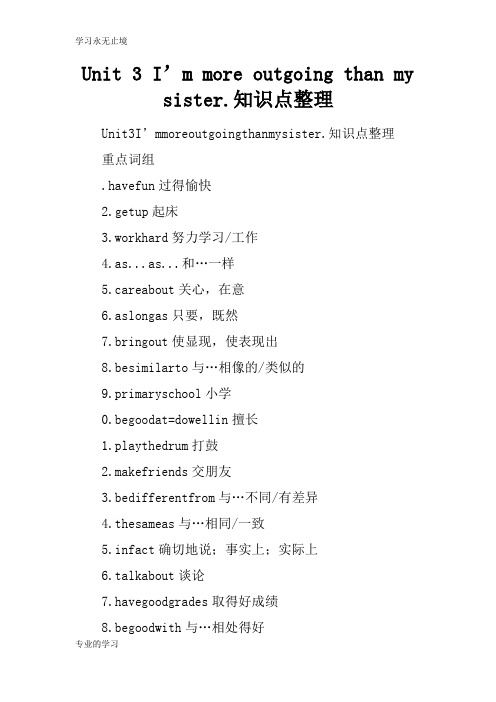
Unit 3 I’m more outgoing than my sister.知识点整理Unit3I’mmoreoutgoingthanmysister.知识点整理重点词组.havefun过得愉快2.getup起床3.workhard努力学习/工作4.as...as...和…一样5.careabout关心,在意6.aslongas只要,既然7.bringout使显现,使表现出8.besimilarto与…相像的/类似的9.primaryschool小学0.begoodat=dowellin擅长1.playthedrum打鼓2.makefriends交朋友3.bedifferentfrom与…不同/有差异4.thesameas与…相同/一致5.infact确切地说;事实上;实际上6.talkabout谈论7.havegoodgrades取得好成绩8.begoodwith与…相处得好9.callsbat+号码拨打号码给某人20.makesblaugh使某人发笑重点句型.I’mmoreoutgoingthanmysister.我比我妹妹更外向。
2.who’smorehard-workingatschool?在学校谁比较勤奋。
3.Themostimportantthingistolearnsomethingandhavefun.最重要的事是学到东西,并过得快乐。
4.whoossmarter,yourmotheroryourfather?你妈妈和你爸爸谁更聪明?重点解析:.BothSamandTomcanplaythedrum,butSamplaysthembet terthanTom.bothadj./pron.两者(都)…,用在be动词、助动词或情态动词之后,实义动词之前。
weshouldboththankTom.我们两个都应该感谢汤姆。
both单独作主语时,其谓语动词要用复数形式Botharesmart.两个人都聪明。
八年级上册Unit3 I’m more outgoing than my sister.课文重难点讲解

Unit3 I’m more outgoing than my sister.课文重难点讲解Section A1. I’m more outgoing than my sister. 我比我妹妹更外向。
【解析】outgoing [aʊtgəʊɪŋ]adj.对人友好的,开朗的;(比较级:more outgoing, 最高级most outgoing)( ) Jason is _____ than most of kids in my class. He is very active.A. outgoingB. more outgoingC. much outgoingD. the most outgoing2. But you can tell that Lisa Practiced a lot more and really wanted to win.但是你可以说莉萨练习得跟多并真的想获胜。
【解析】win vi.. 获胜,成功【拓展】beat 和win(1)beat 后接比赛、战斗、辩论等的对手,可以是人或集体。
I can beat you at swimming.在游泳方面我能击败你(2)win后面一般接后接比赛、战斗、辩论、奖品、钱等,可以是事或者物。
Which team do you think will win the basketball match this time?你认为哪个队会在这次篮球赛中取胜呢?【记】We won the match and we beat them by the score of 5 to 3.①The girls ________the boys in yesterday’s match.②He decided to ________the match.( ) ③They didn’t _____ the basketball match. We ___ them 24-20.A. win; beatB. beat; winC. win; winD. beat; beat【2014浙江宁波】Jenny , you should practice as often as you can ___ the piano competition.A.failB.to failC.winD.to win【2014四川绵阳】19. —Which singer do you think ____ the V oice of China?—I'm not sure. There are still 3 rounds to come.A. wonB. has wonC. will winD. Wins3.【解析】quiet adj安静的→quietly [kwaɪətlɪ] adv轻声地【记】She said to me quietly that I should be quiet.( ) ①We approached (靠近) the birds ___________(quiet) and watched them.( ) ②【2012阜康中考】The mother walked into the room ___ in order not to wake up her baby.A. quicklyB. quietlyC. heavilyD. fast4. I think she sang more clearly than Nelly. 我认为她唱得比内莉更清晰。
unit3-i'm-more-outgoing-than-my-sister重点知识
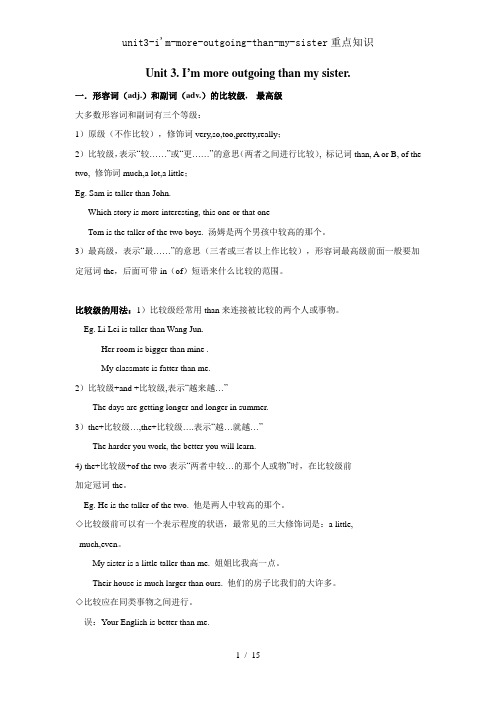
Unit 3. I’m more outgoing than my sister.一.形容词(adj.)和副词(adv.)的比较级, 最高级大多数形容词和副词有三个等级:1)原级(不作比较),修饰词very,so,too,pretty,really;2)比较级,表示“较……”或“更……”的意思(两者之间进行比较), 标记词than, A or B, of the two, 修饰词much,a lot,a little;Eg. Sam is taller than John.Which story is more interesting, this one or that oneTom is the taller of the two boys. 汤姆是两个男孩中较高的那个。
3)最高级,表示“最……”的意思(三者或三者以上作比较),形容词最高级前面一般要加定冠词the,后面可带in(of)短语来什么比较的范围。
比较级的用法:1)比较级经常用than来连接被比较的两个人或事物。
Eg. Li Lei is taller than Wang Jun.Her room is bigger than mine .My classmate is fatter than me.2)比较级+and +比较级,表示“越来越…”The days are getting longer and longer in summer.3)the+比较级…,the+比较级….表示“越…就越…”The harder you work, the better you will learn.4) the+比较级+of the two表示“两者中较…的那个人或物”时,在比较级前加定冠词the。
Eg. He is the taller of the two. 他是两人中较高的那个。
◇比较级前可以有一个表示程度的状语,最常见的三大修饰词是:a little,much,even。
人教新目标八年级英语上册Unit 3 I'm more outgoing than my sister知识点总结和习题(含答案)
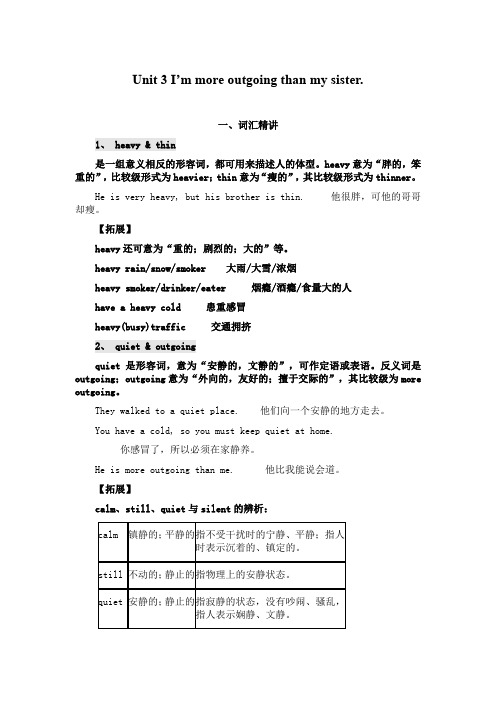
那个小女孩对书感兴趣。
8、 though
(1)though 可以作连词,意为“虽然;即使;纵然”,放在从句的开头和 中间均可。
Though it was raining, we were still working.
虽然下着雨,但我们仍然坚持工作。
(2)though 还可以作副词,意为“然而;但是”,一般放在句末。
Be quiet, everyone. The teacher is coming. 了。
同学们,安静!老师来
We shouldn’t keep silent when the teacher asks us some questions.
当老师问我们问题时,我们不应该保持沉默。
注意:quiet 意为“安静的”,quite 意为“相当”。
More than one boy knows how to play the computer games.
不止一个男孩知道怎样玩电脑游戏。
What he said makes us happy. 他所说的话使我们很高兴。
Don’t keep the door open.
别把门开着。
We made John our monitor.
It was impossible for him to do so much homework. He finished it though.
他不可能完成这么多作业,然而他做完了。
【拓展】
(1)though 和 although 的辨析:
1)两者都可用作连词,意义相同,但 although 常放在从句开头的位置, 不用于从句中间;
而 though 放在从句的开头和中间均可。
Although they are poor, they are happy.=Though they are poor,they are happy.= Poor though they are, they are happy. 虽然他们很穷,但很快 乐。
Unit3 I’m more outgoing than my sister知识点短语归纳总结

Unit3 I’m more outgoing than my sister.一、单词1.adj.外向的2.adj.更好的;较好的 adv.更好地3.adv.大声地;高声地;花俏地4.adv.安静地;悄悄地;平静地5.adj.勤勉的;努力工作的6.n.竞争;比赛7.adj.极好的;了不起的8.adj.哪一个;哪一些 pron.哪一个;哪些9.adv.清楚地;显然地10.v.赢;赢得;获胜;获得 n.胜利11.conj.虽然;尽管;adv.不过12.关心13.adj.有才能的;有天赋的14.adv.真实地;真诚地;正确地15.v.关心;担忧;照顾;在乎16.adj.严肃的;严重的;庄重的17.n.镜子;反映18.adj.必要的;必然的19.adj.两者都 pron.两者20.aux.应该;可能;应当;将要21.vt.触摸;感动22.v.到达;伸出;达成;取得联系;延伸;(伸手)去够23.n.心脏;内心24.n.事实;真相;实际25.v.打碎;折断;违背;解决;中断26.v.发笑;笑;嘲笑 n.笑声;笑;笑料27.adj.类似的28.vt.分享,共享;分配;共有29.adj.大声的;adv.大声地;响亮地30.adj.最初的,最早的31.和 ... 不同32.n.信息;情报;资料;通知33.只要34.拿出;推出35.与 ... 同样的36.事实上;实际上;确切地说37.类似于;与 ... 相似一、词型转换1.outgoing 比较级最高级2.good/well比较级最高级3.loudly 比较级最高级4.quiet 副词5.hard-working比较级最高级6.this比较级最高级7.friendly比较级8.clearly 比较级最高级9.win过去式10.make过去式11.though同义词12.true副词13.serious比较级最高级14.both反义词15.care形容词副词16.reach第三人称单数17.touch第三人称单数18.break过去式19.loud 比较级最高级二、短语归纳1.更外向2.与……一样……3.唱歌比赛4.与……相像的/类似的5.和……相同;与……一致6.与……不同7.关心;介意8.像一面镜子9.最重要的10.只要;既然11.使显现;使表现出12.取得更好的成绩13. 伸手取14.事实上;实际上15.交朋友16.其他的17.感动某人18.有音乐天赋19.对某人来说,做某事……的。
八年级英语上册 Unit 3 I'm more outgoing than my sister短语、语法知识点汇总 (新版)人教新目标版
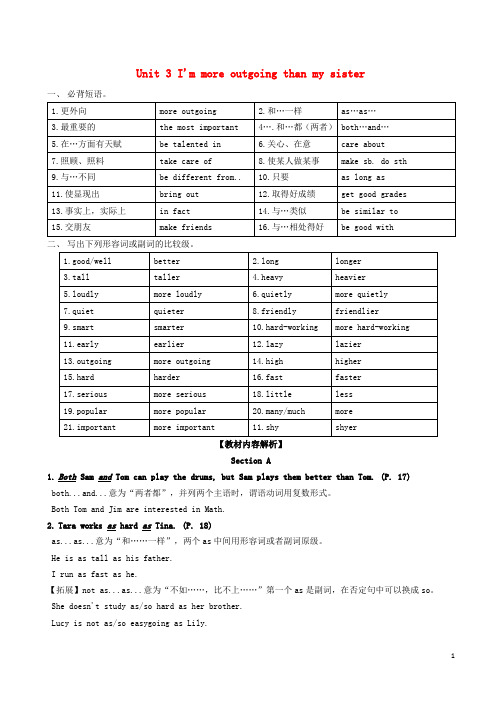
Unit 3 I'm more outgoing than my sister一、必背短语。
二、写出下列形容词或副词的比较级。
【教材内容解析】Section A1.Both Sam and Tom can play the drums, but Sam plays them better than Tom. (P. 17) both...and...意为“两者都”,并列两个主语时,谓语动词用复数形式。
Both Tom and Jim are interested in Math.2.Tara works as hard as Tina. (P. 18)as...as...意为“和……一样”,两个as中间用形容词或者副词原级。
He is as tall as his father.I run as fast as he.【拓展】not as...as...意为“不如……,比不上……”第一个as是副词,在否定句中可以换成so。
She doesn't study as/so hard as her brother.Lucy is not as/so easygoing as Lily.3.Oh, which one was Lisa?(P. 18)which表示“哪一个”,表示在一定数量中进行选择;what用于选择范围较大或者不明确时,表示选择人或物的种类。
There are some books in the box. Which one is yours?What is in the box?4.You can tell that Lisa really wanted to win, though.(P. 18)(1) win表示“赢得”后接比赛、奖项等表示物的名词作宾语;beat表示“打败”,后接某人、团队等表示人的名词作宾语。
They finally beat the other side and won the basketball match.Who won the first prize in the singing contest.(2)这里的though作副词,表示“可是、然而”,放在句末,前用都好隔开。
Unit 3 I'm more outgoing than my sister知识点归纳
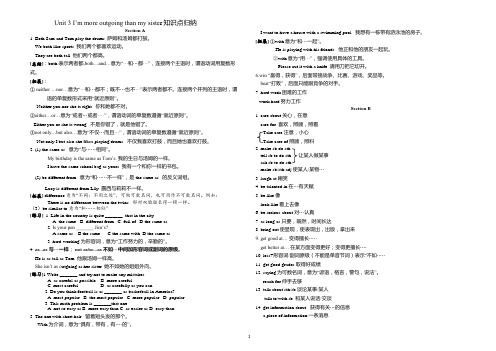
Unit 3 I’m more outgoing than my siste r知识点归纳Section A1. Both Sam and Tom play the drums. 萨姆和汤姆都打鼓。
We both like sports. 我们两个都喜欢运动。
They are both tall. 他们两个都高。
[总结]:both 表示两者都,both…and…意为“···和···都···”,连接两个主语时,谓语动词用复数形式。
[拓展]:①neither …nor…意为“···和···都不;既不···也不···”表示两者都不。
连接两个并列的主语时,谓语的单复数形式采用“就近原则”。
Neither you nor she is right. 你和她都不对。
②either…or…意为“或者···或者····”,谓语动词的单复数遵循“就近原则”。
Either you or she is wrong. 不是你错了,就是他错了。
③not only…but also…意为“不仅···而且···”,谓语动词的单复数遵循“就近原则”。
Not only I but also she likes playing drums. 不仅我喜欢打鼓,而且她也喜欢打鼓。
2. (1) the same as...意为“与······相同”。
My birthday is the same as Tom’s. 我的生日与汤姆的一样。
I have the same school bag as yours. 我有一个和你一样的书包。
Unit 3 I'm more outgoing than my sister核心语法
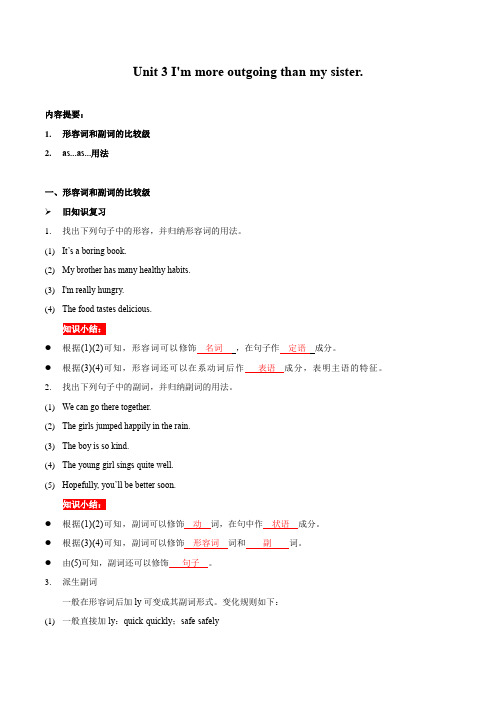
Unit 3 I'm more outgoing than my sister.内容提要:1.形容词和副词的比较级2.as...as...用法一、形容词和副词的比较级➢旧知识复习1.找出下列句子中的形容,并归纳形容词的用法。
(1)It’s a boring book.(2)My brother has many healthy habits.(3)I'm really hungry.(4)The food tastes delicious.●根据(1)(2)可知,形容词可以修饰名词,在句子作定语成分。
●根据(3)(4)可知,形容词还可以在系动词后作表语成分,表明主语的特征。
2.找出下列句子中的副词,并归纳副词的用法。
(1)We can go there together.(2)The girls jumped happily in the rain.(3)The boy is so kind.(4)The young girl sings quite well.(5)Hopefully, you’ll be better soon.●根据(1)(2)可知,副词可以修饰动词,在句中作状语成分。
●根据(3)(4)可知,副词可以修饰形容词词和副词。
●由(5)可知,副词还可以修饰句子。
3.派生副词一般在形容词后加ly可变成其副词形式。
变化规则如下:(1)一般直接加ly:quick-quickly;safe-safely(2)以l结尾的,直接加y:special-specially;hopeful-hopefully(3)以ll结尾的,将直接加y:full-fully;dull-dully(4)以辅音字母+y结尾的,将y改为i,再加ly:happy-happily; lucky-luckily(5)以le,ue结尾的,去e,再加ly:simple-simply;possible-possibly;true-truly 4.几组特殊的词:(1)下列词既是形容词也是副词,但意义不相同。
Unit3I’mmoreoutgoingthanmysister知识讲解文本素材(人教新目标八年级上)

Unit 3 I ’m more out going than my sister.Section A 知识讲解一、hard-working adj 工作努力的,辛勤的 他为了成为一名努力的学生而努力学习。
He works _______ to be a ________ student.二.as ….as 和…..一样as +adj/adv +as not as/so...as 不如······eg. This room is _____ ______ _____that one.这个房间和那个房间一样大。
Tom _____ ____ _______ ____ his brother. Tom 跑的和她弟弟一样快。
She isn’t as outgoing as her sister. 她不如她的姐姐外向。
例题 Listening is just as______ as speaking in language learning.(上海) A important B more important C most important D the most important三.singing competition 歌唱比赛英语中,动词-ing 形式可以充当前置定语修饰后面的名词。
1)They________the game yesterday.他们昨天赢得了那场比赛。
2)She _____ a gold medal in the women ’s singles.她赢得了女子单打金牌。
3 We ______ them and ______ the game.我们打败他们赢得了比赛。
例题 He always ____ the match when we play ping-pong.A beatB winC beatsD wins六.both adj. & pron. 两个;两个都 放在“be”动词、情态动词之后,实义动词之前1. 名词复数,反义:neither 表示两者都不。
Unit 3 I'm more outgoing than my sister. (讲义及答案)

Unit 3 I’m more outgoing than my sister. (讲义) Words and expressionsoutgoing /'aʊtgəʊɪŋ/adj. 爱交际的;友好的;外向的better /'betə(r)/adj. & adv. (good 和well 的比较级)较好的(地);更好的(地)loudly /'laʊdli/ adv. 喧闹地;大声地;响亮地quietly /'kwaɪətli/adv. 轻声地;轻柔地;安静地hard-working /ˌhɑː(r)d'wɜː(r)kɪŋ/adj. 工作努力的;辛勤的competition /ˌkɒmpə'tɪʃn/ n. 比赛;竞赛;竞争fantastic/fæn'tæstɪk/ adj. 极好的;了不起的which/wɪtʃ/ pron. & adj. 哪一个;哪一些clearly /'klɪəli/adv. 清楚地;清晰地;明白地win /wɪn/ v. 获胜;赢;赢得though /ðəʊ/ adv. 不过;可是;然而conj. 虽然;尽管;不过talented /'tæləntɪd/ adj. 有才能的;有才干的truly /'truːli/ adv. 真正;确实care /keə/v. 在意;担忧;关心care about 关心;在意serious /'sɪəriəs/adj. 严肃的;稳重的mirror /'mɪrə(r)/n. 镜子kid /kɪd/ n. 小孩;年轻人as long as 只要;既然necessary /'nesəsəri/adj. 必需的;必要的be different from 与……不同;与……有差异both /bəʊθ/adj. & pron. 两个;两个都bring out 使显现;使表现出grade /greɪd/ n. 成绩等级;评分等级should /ʃʊd/ modal v. 应该;应当;可以the same as 和……相同;与……一致saying /'seɪɪŋ/n. 谚语;格言;警句reach /riːtʃ/ v. 伸手;到达;抵达hand /hænd/ n. 手touch /tʌtʃ/ v. 感动;触摸heart /hɑː(r)t/ n. 内心;心脏fact /fækt/ n. 现实;事实in fact 确切地说;事实上;实际上break /breɪk/ v. (broke /brəʊk/) (使)破;裂;碎;损坏arm /ɑː(r)m/ n. 手臂;上肢laugh /lɑːf/ v. 笑;发笑n. 笑声share /ʃeə/v. 分享;共享;共用;分摊loud /laʊd/ adj. 响亮的;大声的similar /'sɪmələ(r)/adj. 相像的;类似的be similar to 与……相像的、类似的primary /'praɪməri/adj. 最初的;最早的primary school 小学information /ˌɪnfə(r)'meɪʃn/ n. 信息;消息Tara /'tɑːrə/ 塔拉(女名)Sam /sæm/ 萨姆(男名)Nelly /'neli/ 内莉(女名)Larry /'læri/ 拉里(男名)Role-playJulie: Did you like the singing competition yesterday, Anna? Anna: Oh, it was fantastic! Nelly sang so well!Julie: Well, I think Lisa sang better than Nelly.Anna: Oh, which one was Lisa?Julie: The one with shorter hair. I think she sang more clearly than Nelly.Anna: Yes, but Nelly danced better than Lisa.Julie: You can tell that Lisa really wanted to win, though.Anna: Well, everyone wants to win. But the most important thing is to learn something new and have fun.Grammar FocusAre you as friendly as your sister?Does Tara work as hard as Tina? Reading No, I’m not. I’m fr iendlier. Yes, she doesShould friends be the same or different? Read about what these people think. And find the sayings about friends.Jeff GreenMy mother told me a good friend is like a mirror. I’m quieter and more serious than most kids. That’s why I like reading books and I study harder in class. My best friend Yuan Li is quiet too, so we enjoy studying together. I’m shy so it’s not easy for me to make friends. But I think friends are like books—you don’t need a lot of them as long as they’re good.Huang LeiIt’s not necessary to be the same. My best friend Larry is quite different from me. He is taller and more outgoing than me. We both like sports, but he plays tennis better, so he always wins. However, Larry often helps to bring out the best in me. So I’m getting better at tennis. Larry is much less hard-working, though. I always get better grades than he does, so maybe I should help him more.Mary SmithI don’t really care if my friends are the same as me or different. My favorite saying is, “A tr ue friend reaches for your hand and touches your heart.” My best friend Carol is really kind and very funny. In fact, she’s funnier than anyone I know. I broke my arm last year but she made me laugh and feel better. We can talk about and share everything. I know she cares about me because she’s always there to listen.Exercises一、词汇填空1.I want to sit in the first row, so I can see the blackboard(清晰地).2.She is an (外向的) girl and she likes making friends.3.The mother was so happy because her daughter _ (赢得)the singing (比赛) just now.4.Although my father looks (严肃的), he is very kind tokids.5.Do you think it (必需的;必要的) to have a friend whois rich?6.Do you know the (谚语) “A year’s plan starts withspring”?7.You can get lots of useful (信息) on the Internet ifyou use your computer in a right way.8.Look at that bridge! I think it’s(极好的;了不起的).9.My best friend (真正;确实) cares about me.10.When I was young, I (分享;共享) a small room withmy sister.11.The teacher asks us whether we know who (损坏;打破)the glass.12.He is really (有才能的) in music and he can play theguitar very well.二、单项选择( )13. The new teacher is quite Mr. Wang. I like her better.A.different fromB. the same asC. different asD. the same to( )14. —Is Linda your friend?—Yes, she is a funny girl. She often us _ whenwe are together.A. makes; to laughB. makes; laughC. keeps; laughD. keeps; to laugh( )15. She found exciting information about Beijing. She can tell you something about it.A. a fewB. anC. someD. a( )16. —Do you know that girl in the classroom? She’s my friend and she’s quiet.—Well, . Can I talk with her?A. she is the same as meB. she looks like meC. I like herD. we’re both girls( )17. —Which of the two T-shirts will you take?—I’ll take . One is for my brother and the other is formyself.A. eitherB. bothC. allD. many( )18. There are many flowers and trees on sides of the Center Street.A. eachB. everyC. bothD. all( )19. The teacher decides to give the boy another chancehe made some mistakes.A. thoughB. whenC. because ofD. because ( )20. —Can your sister play tennis?—Sure. She plays _ I do.A. as good asB. so good asC. so well asD. as well as三、按要求完成句子,每空一词21.This bike is different from that one. (改为同义句)This bike isn’t the that one.22.They both study very hard. (改为同义句)study very hard.23.只要我陷入困境,我的朋友们就会来帮我。
英语八年级上册Unit 3 I’m more outgoing than my sister.知识点总结

Unit 3 I’m more outgoing than my sister 一、词组、短语:01. more outgoing 更外向/更开朗,02. as...as...与……一样,03. the singing competition 歌咏比赛,04. the most important最重要的,05. be talented in music 在音乐方面有天赋,06. the same as与……相同07. care about 关心/留意/关注,08. be different from与…不同,09. be like a mirror 像一面镜子,10. as long as与…一样长,11. bring out显示/显出/生产/带来,12. get better grade取得好成绩,13. reach for伸手达到/达到14. touch one’s heart 感动,15. in fact 事实上,16. make friends交朋友,17. be good at 在某方面成绩好,18. the other另一个,19. be similar to 对…熟悉,20. be good with与…和睦相处二、重要句子:01. Sam has longer hair than Tom.萨姆的头发比汤姆的长。
02. She also sings more loudly than Tara. 她唱歌也比泰拉声音大。
03. Nelly sang so well. 内莉唱得如此好。
04. For me, a good friend likes to do the same things as me. 对于我来说,好朋友喜欢跟我做相同的事情。
05. Who is smarter, your mother or your father ? 谁更聪明,你妈妈还是你爸爸?06. It’s not necessary to be the same. 没有必要相同。
人教版八年级上Unit3 I'm more outgoing than my sister. 重点短语

Unit3 I'm more outgoing than my sister. 【重点短语】1. more outgoing 更外向;更开朗】more hard-working 更勤奋的2. as 形容词/副词原形as... 与…… 一样……as hard as 与…..一样努力3. not as/so…as… …..不如……4. the most important 最重要的5. be talented in music 在音乐方面有天赋have a talent for 有……的天赋6. the same as 和……相同;与……一致7. care about 关心;在意care for 照顾;非常喜欢be careful 当心;小心take care 当心;小心=look outtake care of 照顾= look after8. be different from 与…...不同9. be like a mirror 像一面镜子10. as long as 只要;既然;与…...一样长11. bring out 使显现;使表现出;出版,生产12. get better grades 取得更好的成绩have good grades 有良好的成绩13. reach for 伸手达到/达到reach for one’s hand 伸手帮某人一把14. reach= get to =arrive at/in 到达15. in fact 事实上16. make friends (with sb.)(和……)交朋be make friends 成为朋友17. be good at 擅长…… =do well in18. the other 另一个19. be similar to 与……相像的、类似的20. be similar in 在某方面相似21. both …and … …..和……都22. play the drums 敲鼓23.be there 随叫随到;不离……左右24. work hard 工作努力hard work 辛苦的工作25. a good listener 善于倾听26. the singing competition 歌咏比赛27. be good with 善于应付……的;与…和睦相处28. touch one’s heart 感动某人29. break one’s 身体部位摔断…的……30. talk about 谈论;讨论31. share sth. with sb. 和…..分享某物32. long straight hair 长直发33. primary school student 小学生34. call …at….. 拔打……找某人35 more information 更多的信息36. get the job 得到这份工作【用法】:1. want to do sth.would like to do sth.feel like doing sth. 想要做某事2. make sb. do 让某人做……Let sb. do sth.3. That’s why… 那就是……的原因4. It’s adj. for sb. to do sth. 对某人来说做某事是……5.enjoy doing sth. 喜欢做某事6. A be 形容词比较级than B A比B……7. A 实义动词副词比较级than B8. 比较级and 比较级越来越……9. the 比较级,the 比较级越……,越……10. 疑问词be/ 动词形容词/副词比较级,A or B?。
Unit 3 I’m more outgoing than my sister重点短语句型作文.

Unit 3 I’m more outgoing than my sister.Section A一、重点短语1. both ... and ... ...和...都2. as... as... 和...一样3. not as/so ... as ... 不如...那样...4. have fun doing sth. 做某事很愉快5. the singing competition 歌咏比赛6. get up 起床7.more outgoing 更外向8. the most important 最重要的9.something new 新的东西二、重点句型1. I’m more outgoing than my sister.我比我的妹妹更外向。
2. Both Sam and Tom can play the drums,but Sam plays them better than Tom.萨姆和汤姆都会打鼓,但是萨姆比汤姆打得好。
3. Is Tom smarter than Sam? 汤姆比萨姆聪明吗?4. Tara works as hard as Tina. 塔拉工作和蒂娜一样努力。
5. Who’s more hard-working at school? 在学校里谁更努力一些?6. That’s Tara, isn’t it ? 那是塔拉,不是吗?7. The most important thing is to learn something new and have fun.最重要的是学到一些新东西并获得乐趣。
三、参考作文(一)I have two good friends. They are Bob and Mary.In some ways, they are the same. They both have short curly hair. They are both friendly and kind. And they both enjoy singing.However, there are some differences between them. Bob is taller than Mary. Mary is outgoing than Bob. Bob likes playing soccer after school. But Mary likes going skating in her free time.(二)I am Sam. My best friend is Jim. We both like to listen to music. And we are both friendly to others. He studies as hard as me.Jim is shorter than me, but he can run faster than me. He is more outgoing and speaks more loudly than me. Jim is funnier than me and he is better at basketball.I’m more serious than Jim. And I like to stay at home and read books. I am better at math and Chinese than him. I think I’m smarter than Jim.I am very happy to be friends with him.Section B一、重点短语1. care about 关心,在意2. the same as ... 和...相同3. be different from ... 与...不同4.be similar to ... 与...相似5. make sb. do sth.使某人做某事6. in fact 事实上,实际上7. as long as 只要,既然8. primary school 小学9. be good with...对...友好10. be good at (doing) sth. 擅长(做)某事11. be talented in在某方面有天赋12. bring out 使显现,使表现出13. bring out the best/worst in sb. 把某人最好的/最坏的一面显露出来14. reach for 伸手(脚)去够... 15. reach for your hand 伸手帮你一把16. reach + 地点= get to + 地点= arrive in + 大地点/ arrive at + 小地点到达...二、重点句型1. That’s why I like reading books and I study harder in class.那就是我喜欢看书而且在班上学习更加努力的原因。
- 1、下载文档前请自行甄别文档内容的完整性,平台不提供额外的编辑、内容补充、找答案等附加服务。
- 2、"仅部分预览"的文档,不可在线预览部分如存在完整性等问题,可反馈申请退款(可完整预览的文档不适用该条件!)。
- 3、如文档侵犯您的权益,请联系客服反馈,我们会尽快为您处理(人工客服工作时间:9:00-18:30)。
Unit 3 I’m more outgoing than my sister.词句精讲精练词汇精讲1. both(1) 代词,意为“两者,双方,两人”。
例如:Both of the flowers are very beautiful. = The flowers are both very beautiful.这两朵花都很漂亮。
(2) 形容词,意为“两者的,双方的”。
例如:She wants both dictionaries. 这两本字典她都想要。
Both the answers are wrong. 这两个答案都是错的。
(3) 副词,意为“两者,两者都是”,常用于行为动词之前,be动词、助动词、情态动词之后。
例如:They can both dance. 他们俩都会跳舞。
(4) both…and意为“……和……都,既……又……”,用于连接两个并列成分,连接并列主语时,谓语动词应该用复数形式。
例如:Both you and your sister like it very much. 你和你姐姐都非常喜欢它。
【拓展】(1) 当both用于否定句时,表示“并非两者都……”。
例如:I don’t like both the sweaters. 这两件毛衣,我并不都喜欢。
(2) both…and…的否定形式为neither…nor…意为“既不……也不……”。
例如:He can speak neither French nor English. 他既不会法语也不会英语。
2. outgoing与quietoutgoing作形容词,意为“外向的,友好的;擅于交际的”,其比较级为more outgoing。
其反义词为quiet,意为“安静的,文静的”,可作定语或表语。
例如:They walked to a quiet place. 他们向一个安静的地方走去。
You have a cold, so you must keep quiet at home. 你感冒了,所以必须在家静养。
He is more outgoing than me. 他比我能说会道。
【拓展】calm,still,quiet与silent:(1)calm 意为“镇静的;平静的”。
指不受干扰时的宁静、平静;指人时表示沉着的、镇定的。
(2)still 意为“不动的;静止的”。
指物理上的安静状态。
(3)quiet意为“安静的;静止的”。
指寂静的状态,没有吵闹、骚乱,指人表示娴静、文静。
(4)silent意为“沉默的;无言的”。
主要指人,指不发出声音或不说话,强调无声的状态。
例如:When we face danger, we should keep calm. 面对危险,我们应该保持沉着、冷静。
The baby kept still when she was taking photos. 当给这个婴儿拍照时,她一动也不动。
Be quiet, everyone. The teacher is coming. 同学们,安静!老师来了。
We shouldn’t keep silent when the teacher asks us some questions.当老师问我们问题时,我们不应该保持沉默。
【注意】quiet意为“安静的”,quite意为“相当”。
3. winwin作动词,意为“赢得;打败;战胜”,其现在分词要双写n,为winning;过去式和过去分词均为won。
例如:He won a prize last week. 他上周得奖了。
They won the basketball match yesterday. 他们昨天赢得了那场篮球比赛。
He knew this was his last hope of winning. 他知道这是他获胜的唯一希望了。
【拓展】win与beat:(1) win强调赢得“比赛、游戏、战争”,获得“名次、奖品”。
例如:win a prize得奖win a game赢得比赛win a honor赢得荣誉win a battle 赢得战斗win a match赢得比赛win a scholarship赢得奖学金(2) beat强调“打败,战胜”,其后只能接比赛、竞争的对手,即beat只能接表示人的词语作宾语。
例如:beat a team 战胜/打败一队(组)beat a nation战争/打败一个国家beat an opponent战胜/打败一个对手4. heavy 与thinheavy和thin是一组意义相反的形容词,都可用来描述人的体型。
heavy意为“胖的,笨重的”,比较级形式为heavier;thin意为“瘦的”,其比较级形式为thinner。
例如:He is very heavy, but his brother is thin. 他很胖,可他的哥哥却瘦。
【拓展】heavy还可意为“重的;剧烈的;大的”等。
例如:heavy rain/snow/smoke大雨/大雪/浓烟heavy smoker/drinker/eater烟瘾/酒瘾/食量大的人have a heavy cold患重感冒heavy(busy) traffic 交通拥挤5. care aboutcare about意为“关心,在意”。
例如:She does not care about her husband at all. 她根本不关心她的丈夫。
Don't you care about this country’s future?难道你不为国家前途担忧吗?I don’t care about money.我不看重钱。
【拓展】care for意为“照顾,照料;想要;喜欢”。
例如:Would you care for some more tea? 想再喝点茶吗?The mother cared for the sick child day and night. 母亲日夜照料着生病的孩子。
I don’t care for riding on a bike very much; I’d rather go on foot.我不太喜欢骑自行车, 宁愿步行。
6. seriousserious作形容词,意为“严肃的、认真的、严重的、危险的”。
比较级为more serious。
常用搭配为:be serious about意为“对……认真”。
例如:How serious the matter is! 问题是多么严重啊!I stopped laughing when I realized he was serious about it.当我意识到他不是开玩笑时,我就不再笑了。
7. touch(1)touch作动词,意为“感动;触摸”。
例如:Don’t touch the paint until it’s dry. 油漆未干,切勿触摸。
His sad story touched our hearts. 他的悲惨的故事深深打动了我们的心。
The peak seems to touch the sky. 山峰似乎已触及天空。
(2)touch作名词,意为“接触;联系”。
例如:The blind have a keen sense of touch. 盲人有敏锐的触觉。
They keep close touch with me. 他们和我保持密切联系。
8. reach(1)reach作动词,意为“伸手;到达;抵达;取得联系”。
例如:He reached into his pocket to get his car keys. 他把手伸进口袋里拿车钥匙。
We reached the nearest railway station last night. 我们昨天晚上到达最近的火车站。
The garden reaches the lake. 花园一直延伸到湖边。
We tried to reach them by phone. 我们试着用电话跟他们联络。
(2)reach作名词,意为“范围”。
例如:The book is out of my reach. 那本书我够不到。
词汇精练I. 汉译英。
1. 相反的观点________________2. 跑得快________________3. 跳得高________________4. 工作努力________________5. 擅长________________6. 赢得比赛________________7. 使显现_______________8. 两者都________________9. 玩得开心______________10. 关心,在意__________________ II. 根据首字母填空。
1. He doesn’t do well in math, a___________ he is good at English and Chinese.2. Most of them have strong i___________ in learning English well.3. Jane isn’t very o___________. She likes to stay at home and do some reading.4. Liu Ying talks more than Liu Li. Liu Li is q___________ than Liu Ying.5. B___________ of the twins are funny.III. 用所给单词的适当形式填空。
1. She is a little _________(heavy) than her sister.2. This book is _________(interest) and I like it very much.3. He is not funny, and he is always very _________(serious).4. Is Jack talented in _________(play) soccer?5. Lucy always _________(beat) me in swimming.6. A true friend _________ (reach) for your hand and _________ (touch)your heart.7. She is very funny and often makes me ________(laugh).8. I enjoy________(sing). I want to be a singer when I grow up.9. Here are ________(photo) of my brother.10. There are some ________(different) between the twins.IV.听力链接。
